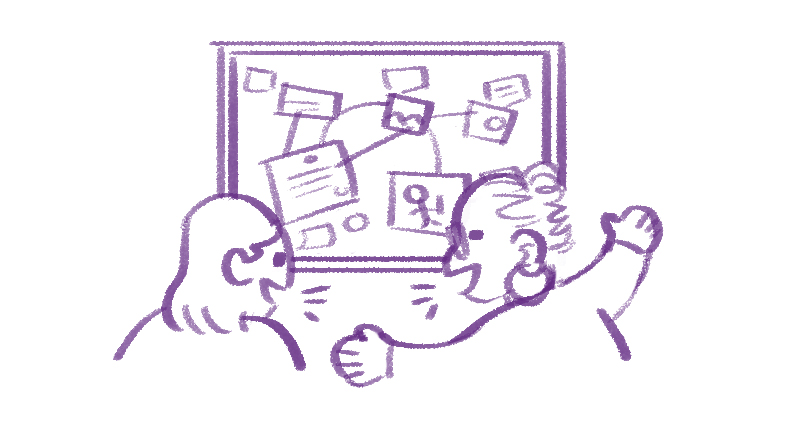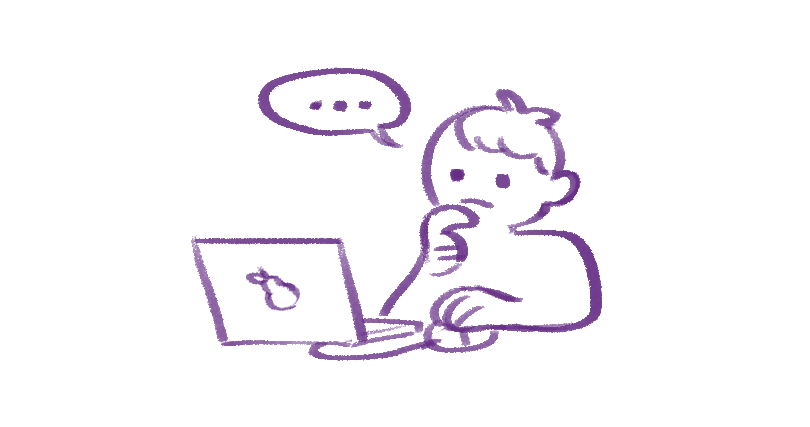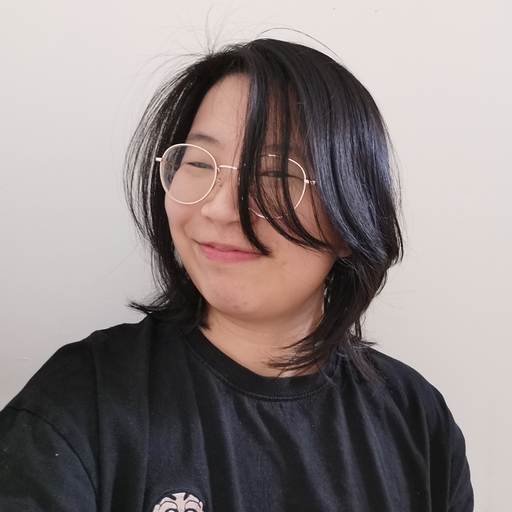For International Women’s Day last week, we spoke to Maddie and Sophie, the women on our team, to hear about their work and thoughts about gender equality within the industry. This week, we’re excited to share a conversation with Paulina Samy, Creative and Managing Director of DragonBear Studios!
Hear about how the studio came to be, the women she looks up to and what goes on behind the scenes of Innchanted, the studio’s exciting co-op adventure that’s currently in development!
Paulina: My name is Paulina Samy, I’m the Creative and Managing director of DragonBear Studios which is a studio I founded with Eleska Boyd. We’ve been operating for about 3 years, and we’re making an indie game called Innchanted.
Ann: Cool! I guess we can start off with how you got into actually setting up DragonBear Studios and getting into game dev?
Paulina: Yeah! Definitely not a normal path, I think. I worked in many professional fields before I decided to do this. I worked in the government, and actually started my own company before this, and I think all these things were really good for getting experience. So when I decided to do this, I was kind of ready and knew what I wanted.
We started by making some prototypes of what we wanted to make, then applied for a grant with Film Victoria and eventually, we were successful. We continued doing that until we eventually got a publisher deal with Asmodea Digital a couple years later. It takes a long time! Right now we’re in full development, which is exciting!

Ann: And it’s coming out this year, right?
Paulina: I’m not allowed to talk about release dates!
Ann: Woops! My bad, haha! Could you tell us about what sort of work you did before DragonBear Studios then? And how it contributed to helping you in setting up the studio?
Paulina: Yeah sure! I worked in the government doing project and policy, which was obviously very good business management and administration experience. It also helped with understanding how the whole corporate world works. Budgets, accounting… all these basic skills you need for running a business were kind of in there. So that’s what I did beforehand, learning to write a lot of proposals, pitches, professional documents, all business administrate-y things. It’s kind of half of my job now! As for the other half of my job as a creative director… I didn’t have any experience before that to be honest! It’s just something you kind of learn as you go.
Ann: I mean, you got your grant from FilmVic, so everything paid off in the end!
Paulina: I think it probably helped that I was very creative, having a lot of creative practices beforehand. Like as a writer, always doing different projects as an artist. All of these things that you do definitely helps!
Ann: Cool! I guess this segues into the question of what you think is the best part about your job and working in this industry?
Paulina: I think it looks really glamorous on the outside, but it’s not haha! Like, it’s really not. It’s very hard work, it’s very time consuming, it’s very detail heavy. Most days it’s pretty intense, you have a lot of work to do, and although you’re excited and motivated to do so, it’s still work. It’s not like how you might imagine it.
Ann: Still have to roll out of bed to get started I guess!
Paulina: Exactly haha! But the things that I do love about my job is meeting new creatives, scheming about what new opportunities we can make with different groups and different organisations and partnerships and yeah! I guess it’s the excitement of finding out all the cool things we can do and people we’ll be able to do it with.
Another favourite is playtesting the game every week! And getting to marvel at the amazing things that our team does and works so hard to improve, create and expand upon so I think it’s really rewarding to see those little changes that happen every single week. Because game development takes so long!
Ann: It is a lot of work, having something to play with at the end of the day must be really rewarding!
Paulina: It is! It’s just really exciting! Our team works really hard and they’re really creative and passionate so it’s great to see these results unfold.
Ann: Yeah! Moving on, what’s a day in your work week like?
Paulina: It really depends on where I am on the production cycle, it really affects the kind of work that I do. I guess because I have two roles I kind of do a much wider range of things than what other more specialised roles might do.
I think a good creative day might be writing a new brief about a new mechanic or idea and how it will be implemented. Maybe scheming with my team on how will this thing work, will this be fun and how can we make this fit in with everything else? I think it’s really fun to take these little pieces and click them together.

Ann: That sounds great! Another thing about IWD is about celebrating achievements that you’ve made, whether it’s to do with your work or outside of it. So what’s one or several of your proudest achievements, whether it’s to do with game dev or not?
Paulina: I think some of my proudest achievements are… there are some pretty interesting ones. For me I think it was really exciting getting to work with a bunch of diverse emerging artists! We had this really exciting placement program/work training program that was funded by Film Victoria. We got to train and work with 3 indigenous artists and part of our studio’s goals was that we really wanted to try and see how we can help train them and get these artists out there and making cool games.
So yeah, I really enjoyed teaching them processes and letting them be creative and after the placement was done and after they finished the work they needed to get done for the project, I just really loved seeing them succeed and go out to other studios. I think celebrating their journey and career progress has been really fulfilling for me.
Ann: Could you elaborate more on how you worked with these indigenous artists for Innchanted?
Paulina: So Phoebe Watson for example, she was one of our core game designers quite early on and she touched so many parts and places of our project, bringing all the cultural elements and values she wanted into the game. Watching her go out to Elders to talk to them and collating the feedback they had about the elements, culture, story and concepts to try to improve the game based on that feedback was really cool. She has moved onto GUCK, and many other amazing projects which is heart warming to see.
For Letoya Muraru and Patricia Mckean they were artists on the team. Letoya was a 2D artist initially and we tried to help her emerge as a 3D artist and she did! She was really good at it, and I think because she had a really strong 2D background, all her UV paintings were just glorious. She moved on to LOG (League of Geeks) recently and it was really exciting to see her there! That’s a really really wonderful progression.
Patricia was a concept artist and she’d make concept art of different things then work with Letoya and the lead artist to fulfil those briefs, trying to make it as authentic and adorable as possible. It was a really cool process.
Ann: Sounds fun to be working with 3 young artists and seeing them flourish elsewhere! Anyway, moving on to more general industry related questions. So how do you think the Australian indie/game dev industry can help better support women in game dev?
Paulina: I think it’s been an interesting time during the pandemic. There’s less connection with other studios because you’re not out at events. We talk about the Australian games industry and what is that? Well it’s like a collective/community of studios as well as the exhilarating parts of that such as the artists and service workers— all the elements within it.
When it comes to better supporting women in game dev it’s a very collective effort of championing women, thinking about your part in the industry and how you can champion women, mentor women, hire women, and undergo cognitive bias training. I think all these things and thinking about your studio’s culture and how supportive of diversity that culture is, impacts the type of applicants you might attract and therefore the type of women or gender diverse women who might apply.
It’s a long term thing of thinking about how we open those doors and I think the Australian industry has changed a lot over the years.

Ann: Yeah, like you said it’s a collective effort to achieve that.
Paulina: I also think, as it is, it’s still very male dominated, and we should think about: how do we create pathways for women and gender diverse people to change the balance of that and to give other opportunities to people.
Ann: Next up, I’m wondering, what sort of advice do you have for women / gender diverse people thinking about getting into the industry?
Paulina: I think women often sell themselves short, so I think they should, when they write their applications or resumes, try to really focus on what experience they actually have because they might underplay it.
Also, make sure you really understand how much of your transferable skills and experience is actually worth, because it’s a lot! It’s relevant. In our studio, we don’t just hire from other game dev streams, we hire from various adjacent industries. Even if you don’t have specific game dev experience, you might have relevant experience that’s still valuable.
Ann: That’s very fair advice. Moving on, who are some women in the game dev industry that you admire/look up to?
Paulina: I feel like there’s so many! There’s so many amazing women in the Australian scene and internationally, like they’re all just doing really cool things. In Australia, I’m so impressed by Wren from Witch Beam, who released Unpacking. What a way of taking the industry by storm with your wholesome game!
Ann: Unpacking did really well, yeah.

Paulina: Yeah! And I think that really shows that it was creatively led by a woman, it’s something different and for an audience that is understood by the makers and I thought “That’s so cool!”. Internationally, I’m thinking of Tanya from Kitfox, Victoria Tran, Evar Karr from Glitch, Chella Ramanan… there’s so many cool women in games!
Ann: That’s lovely to hear! Last few questions from me: What are some of your favourite games and why? Do you have any projects made by women to note?
Paulina: I have a lot of favourite games, so that’s really hard. I love some old school games like Planescape: Torment, Monkey Island… As for games by women, Animal Crossing, Moon Hunters by Tanya from Kitfox. They’ve made so many cool games like Boyfriend Dungeon, and they’re all cool games made by studios led by women!
Ann: What about favourite female in-game characters?
Paulina: There’s this character in Monkey Island called Carla who’s a sword fighter, so I have this theory that she must have been a strong unconsciousl role model because, when I grew up, I became a sword fighter. It might’ve been because I thought she was so cool.
Ann: Wait what? Do you actually know how to use a sword?
Paulina: Yeah I actually do historical sword fighting, and I think it was because of Carla, and probably many other swordfighters too. Maybe, who knows.
Ann: Gosh, that is so cool. Do you own a whole sword and everything?
Paulina: Yes.
Ann: I am so jealous now haha.

Paulina: Other characters… I don’t know, there are so many badass female characters, though I feel like there could be so many more. I’m a little excited about the female characters in our game because I feel like they’re really interesting and strong characters too.
Ann: Last question: What games besides Innchanted are you playing now?
Paulina: So with the steam Next Fest I played: The Wandering Village and Ixion. Both of these games are resource management-y games and over the weekend I also played Far Alone Sails.
Ann: I kind of find it interesting that all these games you mentioned are management-y styled, so in your down-time you’re kind of “working” as well.
Paulina: I guess so, I find it relaxing, and that probably speaks to how my brain works haha.
Innchanted is DragonBear Studio’s exciting co-op adventure game, now available on Steam!

